Parental role in child mental health: A search strategy and literature review
Added on 2022-08-09
32 Pages7165 Words96 Views
Running head: RESEARCH PROPOSAL
Parental role in child mental health
Name of the Student
Name of the University
Author Note
Parental role in child mental health
Name of the Student
Name of the University
Author Note
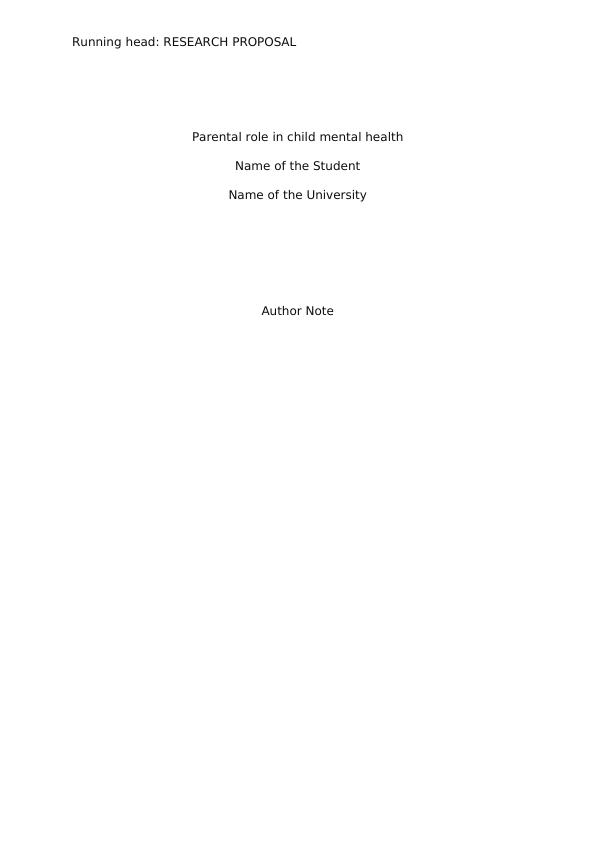
RESEARCH PROPOSAL1
Table of Contents
Introduction.................................................................................................3
Background.................................................................................................3
Definitions................................................................................................3
Search strategy and literature review.........................................................4
Literature review.........................................................................................5
Attachment with parents and child mental health...................................5
Parenting and child mental health...........................................................6
Parental divorce and child mental health.................................................8
Research question.......................................................................................9
Aim and Objectives.....................................................................................9
Aim...........................................................................................................9
Objectives................................................................................................9
Methodology................................................................................................9
Method/data collection...........................................................................10
Data analysis..........................................................................................11
Sampling and recruitment......................................................................12
Quality and rigour.....................................................................................13
Ethics and Research governance..............................................................13
Limitations.................................................................................................14
Time frame................................................................................................15
References................................................................................................17
Appendices................................................................................................21
PRISMA chart..........................................................................................21
Summary table.......................................................................................22
Interview questions................................................................................27
Table of Contents
Introduction.................................................................................................3
Background.................................................................................................3
Definitions................................................................................................3
Search strategy and literature review.........................................................4
Literature review.........................................................................................5
Attachment with parents and child mental health...................................5
Parenting and child mental health...........................................................6
Parental divorce and child mental health.................................................8
Research question.......................................................................................9
Aim and Objectives.....................................................................................9
Aim...........................................................................................................9
Objectives................................................................................................9
Methodology................................................................................................9
Method/data collection...........................................................................10
Data analysis..........................................................................................11
Sampling and recruitment......................................................................12
Quality and rigour.....................................................................................13
Ethics and Research governance..............................................................13
Limitations.................................................................................................14
Time frame................................................................................................15
References................................................................................................17
Appendices................................................................................................21
PRISMA chart..........................................................................................21
Summary table.......................................................................................22
Interview questions................................................................................27
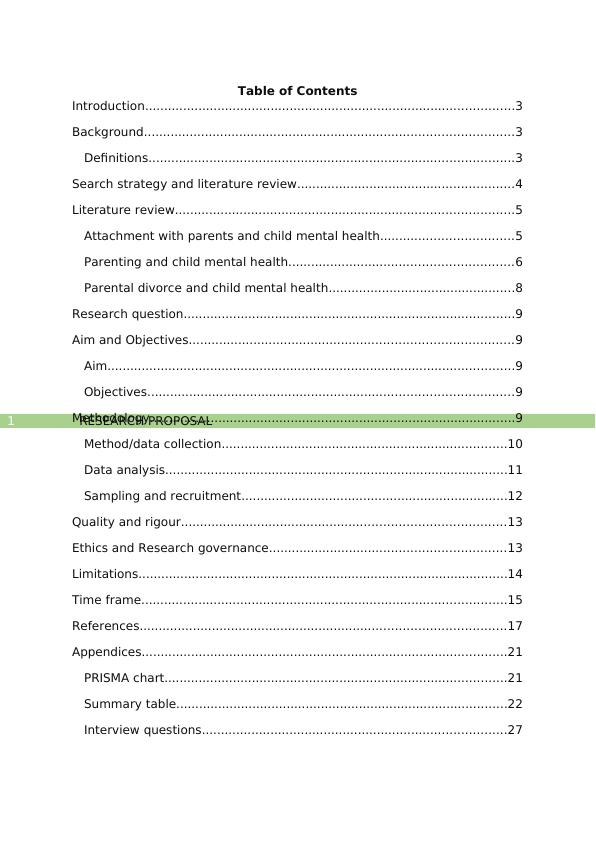
RESEARCH PROPOSAL2
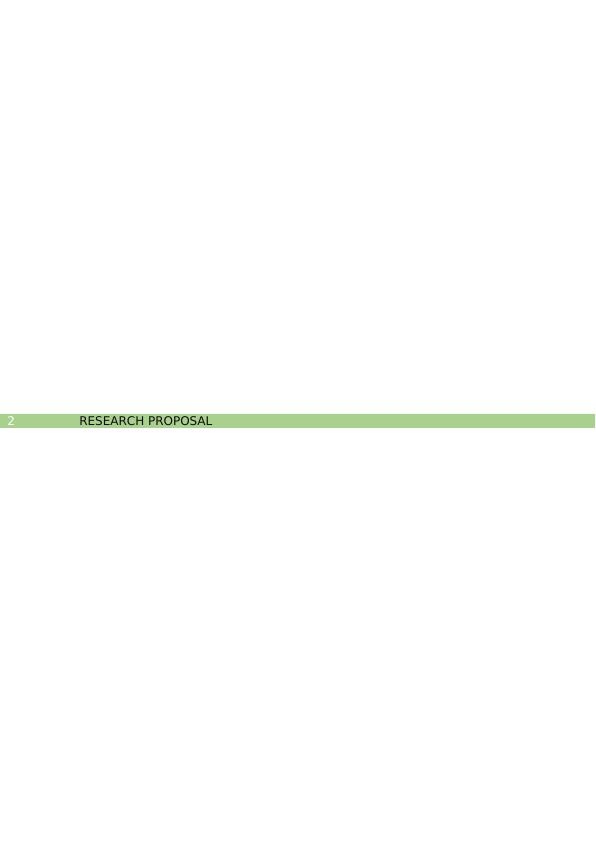
RESEARCH PROPOSAL3
Introduction
The following proposal sets out a qualitative protocol for
determining the impact that parents have on the mental health of their
children. The research will be conducted amid parents and child
counsellors, and will utilise interview and focus groups as the method of
data collection, followed by a thematic analysis.
Background
Definitions
Mental health- It encompasses the psychological, emotional, and
social wellbeing of people and affects the manner in which individuals act,
feel or think.
Parenting or child rearing- The procedure of supporting and
promoting the emotional, physical, intellectual, and social development of
children from their infancy to adulthood.
Parental divorce- The termination of a family in the form of a unit
that happens when the mother and father decide no longer to remain
married.
Attachment- The emotional bond developed between infants and
their caregivers, typically parents that helps in addressing the primary
needs of the infants.
The World Health Organisation defines mental health as the state of
wellbeing that allows a person to realise own capabilities, cope with life
stressors, and work in a productive and fruitful manner, thus making
significant contributions to the entire community (WHO, 2020). As per
records, mental health problems create an impact on 1 in 10 kids and
young people. The common problems faced by the target population are
anxiety, depression, and conduct disorder, and are manifested as a direct
consequence of the events occurring in their daily lives (Mental Health
Foundation, 2016). According to Allen et al. (2018) children’s
psychopathology risk and behaviour can be affected by a range of
Introduction
The following proposal sets out a qualitative protocol for
determining the impact that parents have on the mental health of their
children. The research will be conducted amid parents and child
counsellors, and will utilise interview and focus groups as the method of
data collection, followed by a thematic analysis.
Background
Definitions
Mental health- It encompasses the psychological, emotional, and
social wellbeing of people and affects the manner in which individuals act,
feel or think.
Parenting or child rearing- The procedure of supporting and
promoting the emotional, physical, intellectual, and social development of
children from their infancy to adulthood.
Parental divorce- The termination of a family in the form of a unit
that happens when the mother and father decide no longer to remain
married.
Attachment- The emotional bond developed between infants and
their caregivers, typically parents that helps in addressing the primary
needs of the infants.
The World Health Organisation defines mental health as the state of
wellbeing that allows a person to realise own capabilities, cope with life
stressors, and work in a productive and fruitful manner, thus making
significant contributions to the entire community (WHO, 2020). As per
records, mental health problems create an impact on 1 in 10 kids and
young people. The common problems faced by the target population are
anxiety, depression, and conduct disorder, and are manifested as a direct
consequence of the events occurring in their daily lives (Mental Health
Foundation, 2016). According to Allen et al. (2018) children’s
psychopathology risk and behaviour can be affected by a range of
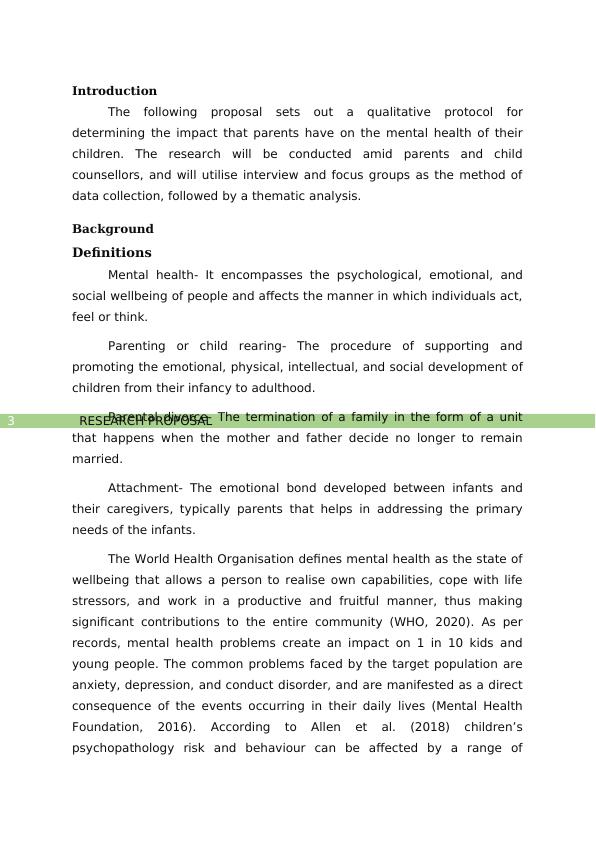
RESEARCH PROPOSAL4
parental characteristics such as, socioeconomic status, mental health,
parenting skills, attachment, and migrant status. Findings from most
recent survey in the UK highlighted that were around 12.5% children and
adolescents aged from 5-19 years who reported the presence of at least
one mental illness in 2017 (Gov.UK, 2019). This calls for the need of
identifying the role that parents play in the mental health of their children.
Search strategy and literature review
The search question and search terms for this research proposal
were identified using the PEO framework. PEO is a popular scientific
framework that is particular beneficial while investigating the likelihood of
prognosis of the development of particular conditions, as a direct
consequence of an exposure or a pre-existing condition (Speckman &
Friedly, 2019).
Patient/Population Children, kids, progenies, offspring,
child
Exposure Role of parents, parentages,
paternities, attachment, parenting,
child rearing, parental anxiety
Outcome Mental health, mental disorder,
psychiatric disorder, mental
behaviour
Table 1- PEO framework for search terms
The aforementioned search terms were combined using boolean
operators ‘AND’ and ‘OR’. While the former helped in extraction of articles
that contained all the search terms entered in the databases, the latter
narrowed down the hits to only those articles that contained either of the
terms (McGowan et al., 2016). This was followed by usage of wildcards to
identify variations of the key words. Wildcards also proved beneficial in
exploring American and British spellings like ‘behavio?r’ helped in
extracting articles that contained both ‘behaviour’ and ‘behavior’. These
were entered in two electronic databases of Google scholar and CINAHL.
CINAHL was selected since it contains numerous articles on allied health,
parental characteristics such as, socioeconomic status, mental health,
parenting skills, attachment, and migrant status. Findings from most
recent survey in the UK highlighted that were around 12.5% children and
adolescents aged from 5-19 years who reported the presence of at least
one mental illness in 2017 (Gov.UK, 2019). This calls for the need of
identifying the role that parents play in the mental health of their children.
Search strategy and literature review
The search question and search terms for this research proposal
were identified using the PEO framework. PEO is a popular scientific
framework that is particular beneficial while investigating the likelihood of
prognosis of the development of particular conditions, as a direct
consequence of an exposure or a pre-existing condition (Speckman &
Friedly, 2019).
Patient/Population Children, kids, progenies, offspring,
child
Exposure Role of parents, parentages,
paternities, attachment, parenting,
child rearing, parental anxiety
Outcome Mental health, mental disorder,
psychiatric disorder, mental
behaviour
Table 1- PEO framework for search terms
The aforementioned search terms were combined using boolean
operators ‘AND’ and ‘OR’. While the former helped in extraction of articles
that contained all the search terms entered in the databases, the latter
narrowed down the hits to only those articles that contained either of the
terms (McGowan et al., 2016). This was followed by usage of wildcards to
identify variations of the key words. Wildcards also proved beneficial in
exploring American and British spellings like ‘behavio?r’ helped in
extracting articles that contained both ‘behaviour’ and ‘behavior’. These
were entered in two electronic databases of Google scholar and CINAHL.
CINAHL was selected since it contains numerous articles on allied health,
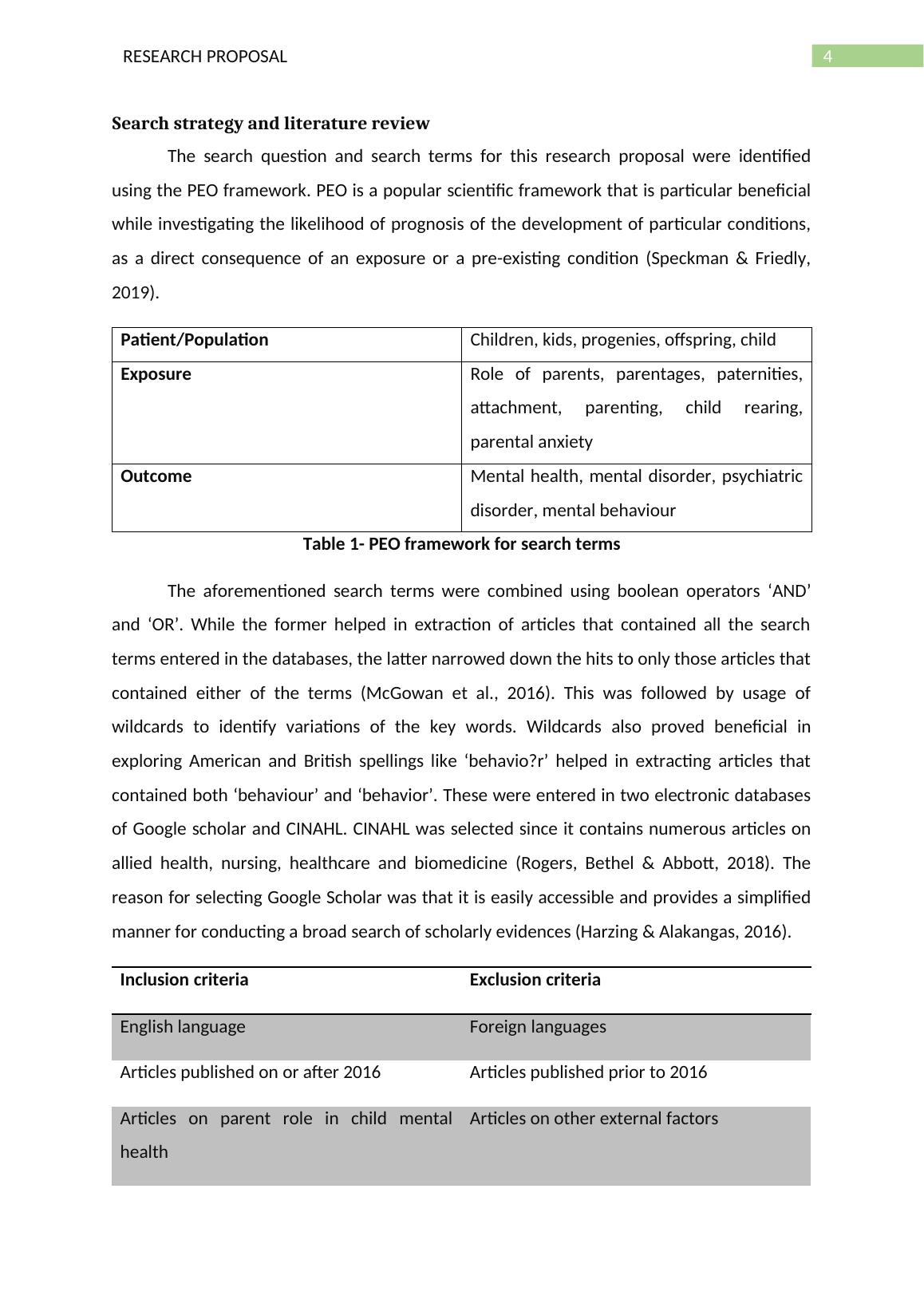
RESEARCH PROPOSAL5
nursing, healthcare and biomedicine (Rogers, Bethel & Abbott, 2018). The
reason for selecting Google Scholar was that it is easily accessible and
provides a simplified manner for conducting a broad search of scholarly
evidences (Harzing & Alakangas, 2016).
Inclusion criteria Exclusion criteria
English language Foreign languages
Articles published on or after 2016 Articles published prior to 2016
Articles on parent role in child
mental health
Articles on other external factors
Peer reviewed articles Clinical guidelines
Primary and secondary research
articles
Case series
Table 2- Eligibility criteria
After extracting the articles from the databases, the PRISMA
(Preferred Reporting Items for Systematic Reviews and Meta-Analyses)
was utilised for identifying the significance of the curated scholarly
literature (Tricco et al., 2018) (refer to appendix). With the aim of
critiquing the studies, the CASP (Critical Appraisal Skills Programme) was
used that helped in assessing the relevance, sample, validity, findings and
applicability of the articles (CASP, 2017).
Literature review
9 articles were considered relevant to the phenomenon under
investigation that are presented under particular themes below:
Attachment with parents and child mental health
Juan, Washington and Kurlychek (2017) conducted a study to
determine the link between aggressive behaviour in children with parent
attachment and partner violence. The researchers addressed the issue
that association between violence exposure in homes and later
manifestation of violent behaviour amid children is well acknowledged in
nursing, healthcare and biomedicine (Rogers, Bethel & Abbott, 2018). The
reason for selecting Google Scholar was that it is easily accessible and
provides a simplified manner for conducting a broad search of scholarly
evidences (Harzing & Alakangas, 2016).
Inclusion criteria Exclusion criteria
English language Foreign languages
Articles published on or after 2016 Articles published prior to 2016
Articles on parent role in child
mental health
Articles on other external factors
Peer reviewed articles Clinical guidelines
Primary and secondary research
articles
Case series
Table 2- Eligibility criteria
After extracting the articles from the databases, the PRISMA
(Preferred Reporting Items for Systematic Reviews and Meta-Analyses)
was utilised for identifying the significance of the curated scholarly
literature (Tricco et al., 2018) (refer to appendix). With the aim of
critiquing the studies, the CASP (Critical Appraisal Skills Programme) was
used that helped in assessing the relevance, sample, validity, findings and
applicability of the articles (CASP, 2017).
Literature review
9 articles were considered relevant to the phenomenon under
investigation that are presented under particular themes below:
Attachment with parents and child mental health
Juan, Washington and Kurlychek (2017) conducted a study to
determine the link between aggressive behaviour in children with parent
attachment and partner violence. The researchers addressed the issue
that association between violence exposure in homes and later
manifestation of violent behaviour amid children is well acknowledged in
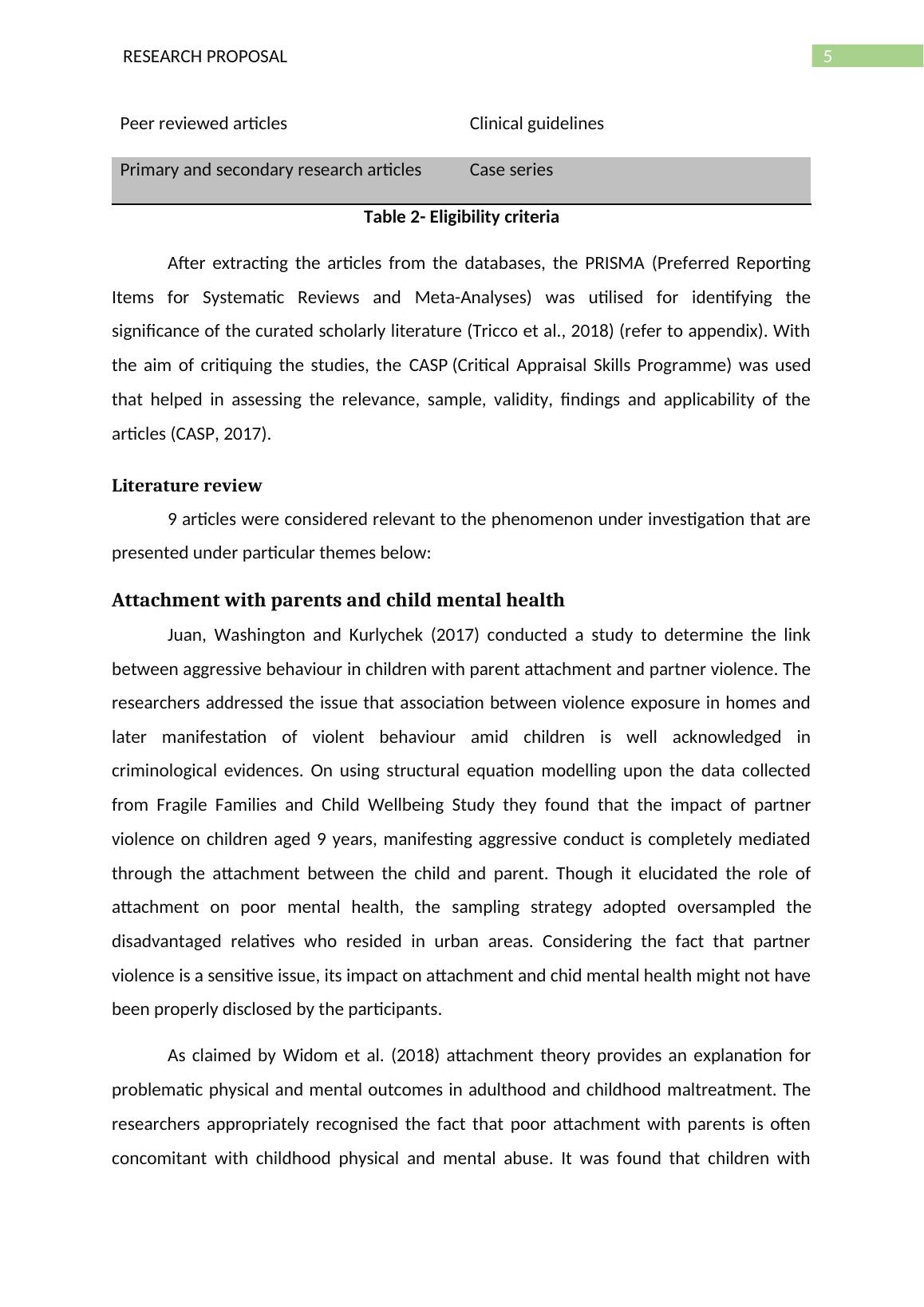
RESEARCH PROPOSAL6
criminological evidences. On using structural equation modelling upon the
data collected from Fragile Families and Child Wellbeing Study they found
that the impact of partner violence on children aged 9 years, manifesting
aggressive conduct is completely mediated through the attachment
between the child and parent. Though it elucidated the role of attachment
on poor mental health, the sampling strategy adopted oversampled the
disadvantaged relatives who resided in urban areas. Considering the fact
that partner violence is a sensitive issue, its impact on attachment and
chid mental health might not have been properly disclosed by the
participants.
As claimed by Widom et al. (2018) attachment theory provides an
explanation for problematic physical and mental outcomes in adulthood
and childhood maltreatment. The researchers appropriately recognised
the fact that poor attachment with parents is often concomitant with
childhood physical and mental abuse. It was found that children with
documented instances of neglect and abuse demonstrated increased level
of anxious attachment style, with a direct correlation between avoidant
attachment and neglect. Both the types of attachment were associated
with depression, low self-esteem and anxiety amid the victims. Thus, the
article was beneficial in affirming that since childhood maltreatment acts
in the form of a risk factor for insecure attachment, which in turn
threatens physical and mental health outcomes, attachment might serve
as a significant pathway. However, the sample comprised of people
belonging to low socioeconomic status, thus decreasing generalisation of
the findings. The researchers failed to use the Adult Attachment Interview
tool and self-reported method of data collection might have prevented
disclosure of relevant facts.
The same had been affirmed by Zimmer-Gembeck et al. (2017) who
summarised the existing evidences on parent-child attachment and
capacity of children, in relation to coping with stress and emotional
regulation. The researchers elucidated that coping and regulatory issues
of children demonstrated signs of ambivalent attachment. It was found
criminological evidences. On using structural equation modelling upon the
data collected from Fragile Families and Child Wellbeing Study they found
that the impact of partner violence on children aged 9 years, manifesting
aggressive conduct is completely mediated through the attachment
between the child and parent. Though it elucidated the role of attachment
on poor mental health, the sampling strategy adopted oversampled the
disadvantaged relatives who resided in urban areas. Considering the fact
that partner violence is a sensitive issue, its impact on attachment and
chid mental health might not have been properly disclosed by the
participants.
As claimed by Widom et al. (2018) attachment theory provides an
explanation for problematic physical and mental outcomes in adulthood
and childhood maltreatment. The researchers appropriately recognised
the fact that poor attachment with parents is often concomitant with
childhood physical and mental abuse. It was found that children with
documented instances of neglect and abuse demonstrated increased level
of anxious attachment style, with a direct correlation between avoidant
attachment and neglect. Both the types of attachment were associated
with depression, low self-esteem and anxiety amid the victims. Thus, the
article was beneficial in affirming that since childhood maltreatment acts
in the form of a risk factor for insecure attachment, which in turn
threatens physical and mental health outcomes, attachment might serve
as a significant pathway. However, the sample comprised of people
belonging to low socioeconomic status, thus decreasing generalisation of
the findings. The researchers failed to use the Adult Attachment Interview
tool and self-reported method of data collection might have prevented
disclosure of relevant facts.
The same had been affirmed by Zimmer-Gembeck et al. (2017) who
summarised the existing evidences on parent-child attachment and
capacity of children, in relation to coping with stress and emotional
regulation. The researchers elucidated that coping and regulatory issues
of children demonstrated signs of ambivalent attachment. It was found
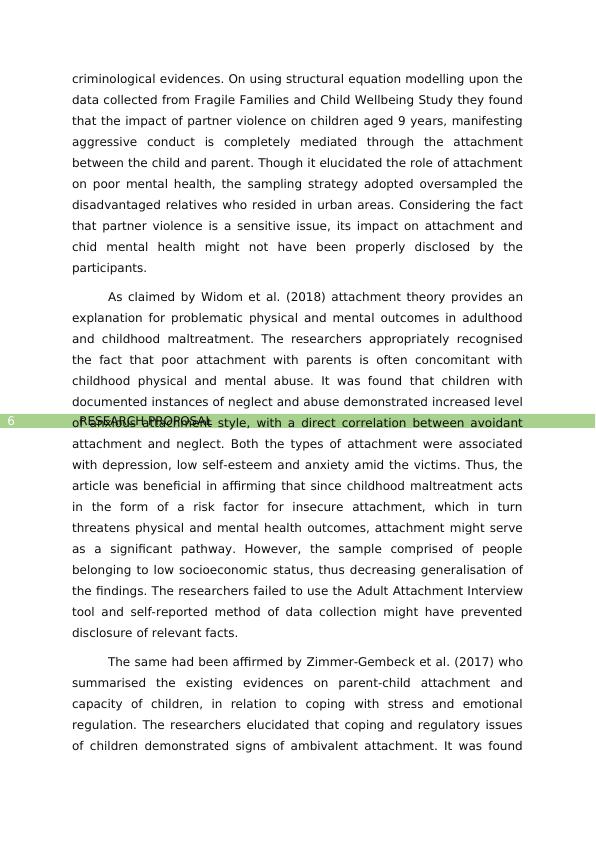
RESEARCH PROPOSAL7
that children manifesting signs of avoidant attachment placed their
confidence on self-related regulation (or coping and less social-oriented
regulation). However, they could not present adequate evidence on the
correlation between emotional regulation of children and ambivalent
attachment.
Despite the vast information on role of parent attachment on child
behaviour and prevalence of anxiety and aggression, not much research
has been conducted to determine the effects that poor attachment has on
the incidence of depression, thus calling for the need to assess the role
that parent-child attachment plays on these two mental disorders.
Parenting and child mental health
Ryan, O’Farrelly and Ramchandani (2017) also evaluated the impact
of parenting on mental health of children and correctly identified the fact
that as much as 30% GP consultations related to behavioural problems
amongst children create lasting impact on their life. The researchers were
accurate in recognising that parenting is a significant risk factor in
maintenance and development, nonetheless is amenable to change. On
evaluating the impact of six parenting programmes in the UK, they
observed that the Incredible Years program was most beneficial in
bringing about significant enhancements in the parental mental wellbeing,
which in turn improved academic performance of toddlers, despite the
lack of evidence for its impact on child behaviour. This made the
researchers conclude that parenting programs are most effective when
the mental health of children is promoted in the community and this can
be accomplished by fostering collaboration between the community
services, education settings and NHS.
As affirmed by Vasilyeva and Shcherbakov (2016) the modern
family is experiencing a catastrophe, characterized by reduced adult
accountability for the complete personal growth of a child. Nonetheless,
they correctly identified that it is the psychosomatic climate and
particularly the particular features of family relations that play a
conclusive part. On determining the association between parental
that children manifesting signs of avoidant attachment placed their
confidence on self-related regulation (or coping and less social-oriented
regulation). However, they could not present adequate evidence on the
correlation between emotional regulation of children and ambivalent
attachment.
Despite the vast information on role of parent attachment on child
behaviour and prevalence of anxiety and aggression, not much research
has been conducted to determine the effects that poor attachment has on
the incidence of depression, thus calling for the need to assess the role
that parent-child attachment plays on these two mental disorders.
Parenting and child mental health
Ryan, O’Farrelly and Ramchandani (2017) also evaluated the impact
of parenting on mental health of children and correctly identified the fact
that as much as 30% GP consultations related to behavioural problems
amongst children create lasting impact on their life. The researchers were
accurate in recognising that parenting is a significant risk factor in
maintenance and development, nonetheless is amenable to change. On
evaluating the impact of six parenting programmes in the UK, they
observed that the Incredible Years program was most beneficial in
bringing about significant enhancements in the parental mental wellbeing,
which in turn improved academic performance of toddlers, despite the
lack of evidence for its impact on child behaviour. This made the
researchers conclude that parenting programs are most effective when
the mental health of children is promoted in the community and this can
be accomplished by fostering collaboration between the community
services, education settings and NHS.
As affirmed by Vasilyeva and Shcherbakov (2016) the modern
family is experiencing a catastrophe, characterized by reduced adult
accountability for the complete personal growth of a child. Nonetheless,
they correctly identified that it is the psychosomatic climate and
particularly the particular features of family relations that play a
conclusive part. On determining the association between parental
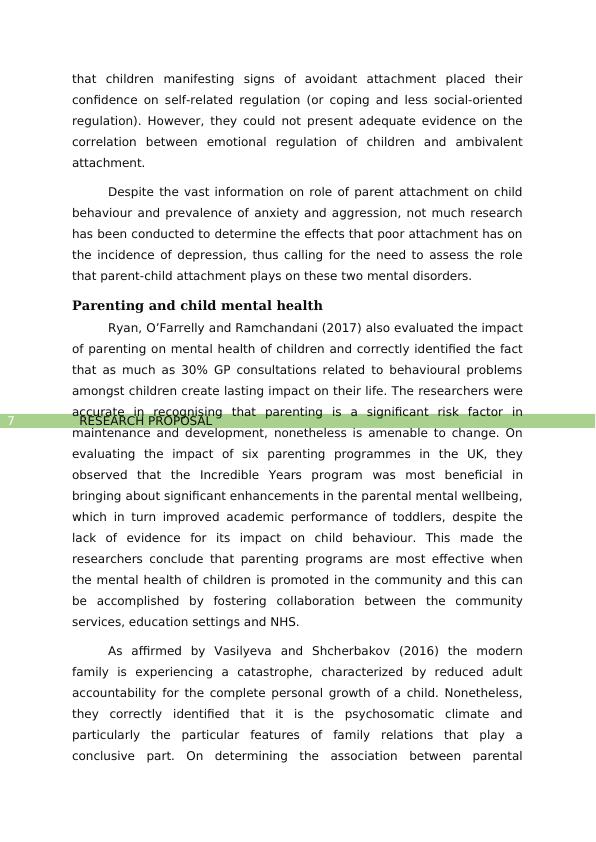
End of preview
Want to access all the pages? Upload your documents or become a member.
Related Documents
Impact of Parental Divorce on Children's Wellbeing PDFlg...
|31
|7211
|265
The Effects of Divorce on Children - Research Projectlg...
|16
|3765
|266
Impact of Divorce on Child Well-Beinglg...
|10
|2525
|434
Impact of Parents Divorce on Children Well-beinglg...
|14
|1433
|30
Impact of Domestic Violence and Parental Divorce on Child's Mental Health in UKlg...
|24
|6678
|373
Impact of Substance Abuse on Parent-Infant Relationshiplg...
|8
|2321
|97
